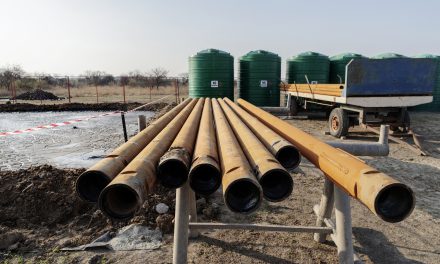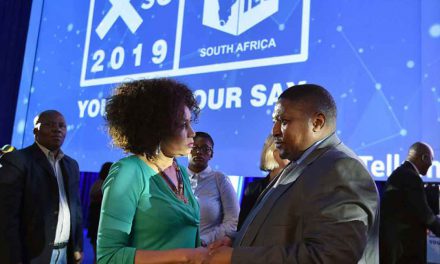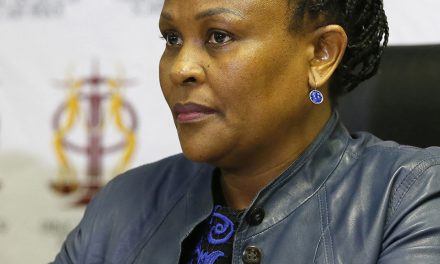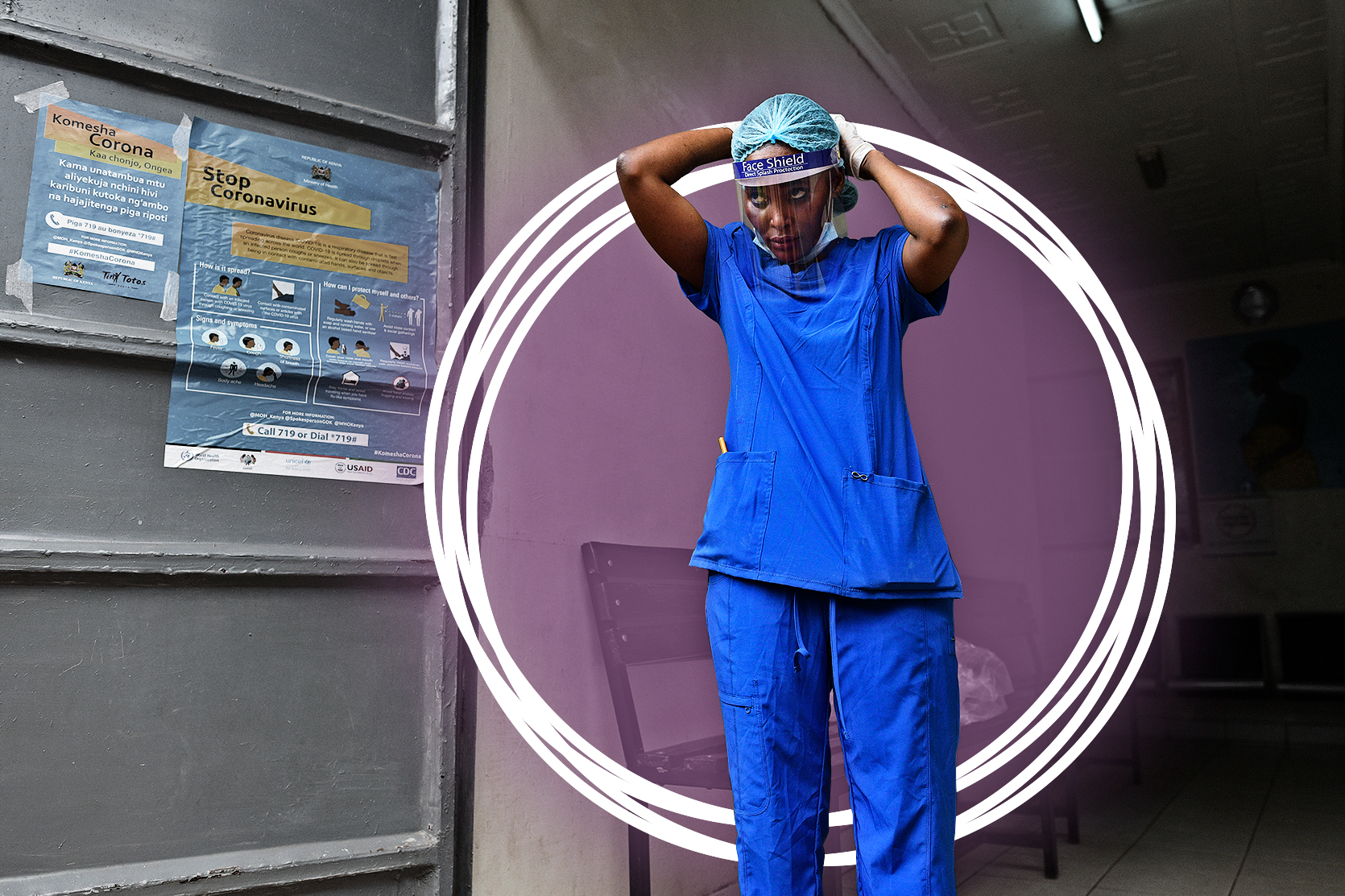President Cyril Ramaphosa addressed the United Nations General Assembly on 19 September. He rightly said that many developing nations are unlikely to meet sustainable development goals. To address development challenges, he said, we “require targeted investment, technology transfer and capacity building support, especially in key areas such as industrialisation, infrastructure, agriculture, water energy, education and health”.
In the midst of addressing our own energy security problems in South Africa, water security, a critical risk that is set to increase in the coming decade, often receives less public attention. The failure to adequately address strains on the country’s water infrastructure can have disastrous consequences, as demonstrated by the recent cholera outbreak in Tshwane or persistent water shortages in the Greater Giyani local municipality.
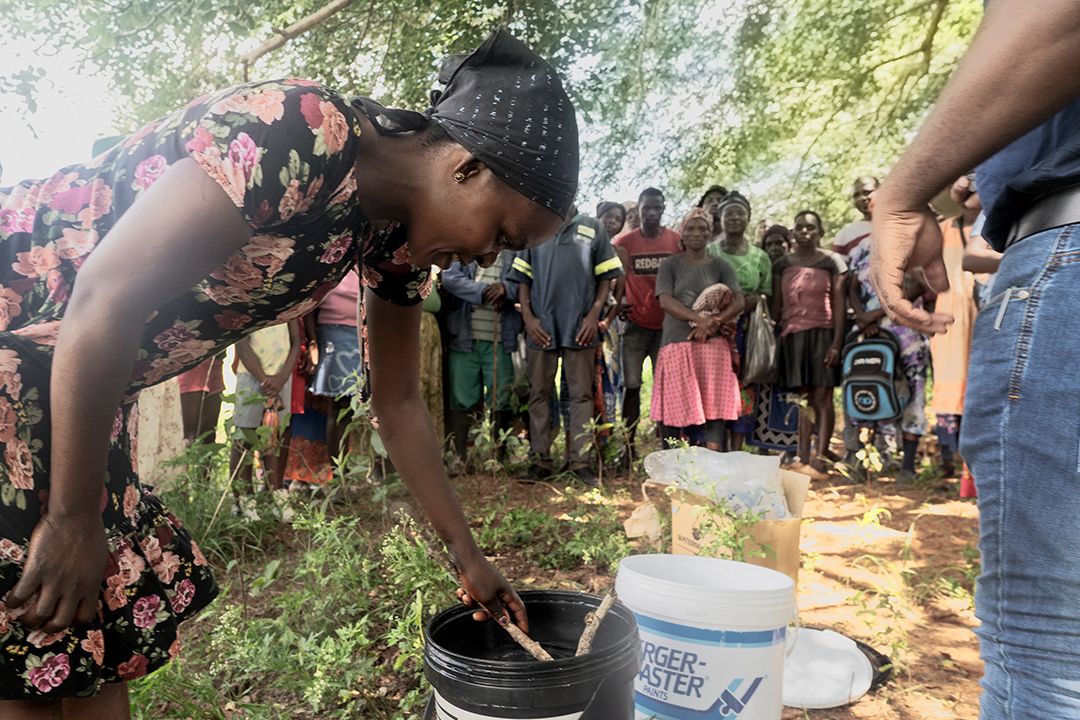
A woman in the village of Mekemeke, Mpumalanga, purifying water with chlorine, to prevent cholera outbreaks, after the floods which severely affected several municipalities in Mpumalanga, on February 16, 2023. (Photo by AFP)
The World Bank states that the percentage of the population using basic drinking water services has increased from 84.58% to 94.49% in 2022. The mortality rate attributed to unsafe water and sanitation and poor hygiene (per 100 000 people), was calculated at 27.6 in 2019. There is no longitudinal data, though, so we cannot ascertain whether progress is being made in terms of reducing the rate.
The International Panel on Climate Change (IPCC) is clear in its findings that climate-induced changes in water cycles and drought will increase across Southern Africa over the next decade. South Africa is one of the driest countries in the world. It ranks 29th out of 193 countries surveyed by the IPCC, with an average annual rainfall of about 50% of the world average. In addition, since 2015, South Africa has been experiencing record-low levels of annual rainfall and increased temperatures. IPCC models predict that by 2050, South Africa will see a threefold increase in its climate variability range. What’s more, the risk of decreased precipitation in the country is three to four times higher than the risk of increased precipitation. In this context, addressing our water security risks is critical to avoiding disaster.
Climate change can have deleterious effects on water quantity and quality. The effects of extreme weather events on water availability, predictability and pollution are increasing, threatening sustainable development, biodiversity and access to water and sanitation. In addition to contaminating land and water resources, flooding and rising sea levels can cause damage to water and sanitation infrastructure, such as water points, wells, toilets and wastewater treatment plants. Droughts and wildfires are triggering civil unrest and migration in many areas. Destruction of vegetation and tree cover exacerbates soil erosion and reduces groundwater recharge, increasing water scarcity and food insecurity. In addition, climate change is likely to increase water demand while shrinking water supplies. This shifting balance means that policymakers are faced with simultaneously meeting the needs of growing populations, sensitive ecosystems, farmers, ranchers, energy producers and manufacturers.
South Africa is heavily reliant on rainwater. Climate change has resulted in unpredictable and irregular rainfall patterns with reduced and unevenly distributed water availability. As a relatively dry country, South Africa has a mean annual precipitation of 463.42mm. Population growth and rapid urbanisation is putting additional strain on South Africa’s water infrastructure, which has seen decades of under-investment. More than 60% of the country’s dams are overexploited and only a third of the rivers are in good condition.
Compounding the problems created by climate change is the poor governance of the country’s water systems. This includes limited maintenance of ageing infrastructure, which results in extensive water losses, as well as a lack of investment. Combined with low rainfall in recent years, this has caused severe water crises such as the Cape Town water shortage from 2014 to 2017. According to Earth.Org, about 70 million litres of treated clean drinkable water is estimated to be lost daily through extensive leaks in the country’s water piping system. Increasingly, water scarcity issues are being taken up by civil society. The Water Crisis Committee, formed in response to the extensive leaks in the country’s water piping system for example, has fixed more than 9 700 leaks while also lobbying the government to be more proactive in addressing the issue.
While the government has prioritised strategic projects, such as the Giyani water project, in an effort to address water security problems, poor governance has undermined their efficacy. The Giyani water project, for example, was established to improve water service in the Greater Giyani local municipality by transferring water from Nandoni Dam to augment the Nsami and Middle Letaba water systems. This project is meant to supply three water service authorities: Vhembe, Mopani and Capricorn. It included refurbishing water and sanitation infrastructure such as pump systems and repairs of leaking reservoirs.
However, this project has faced contractual problems, tender irregularities and corruption resulting in a 10-year delay. The inability of the government to improve the area’s supply infrastructure means it cannot meet the water requirements to sustain villages in Giyani. The lack of oversight and due diligence by the Department of Water and Sanitation to ascertain that the project is being implemented effectively and the failure of the government to provide basic services such as clean water, brings into question good governance practices.
The cholera outbreak in Hammanskraal (Tshwane) earlier this year, which resulted in the deaths of 15 people and 40 being admitted to hospital can be attributed to similar governance failures. The outbreak was allegedly the result of pollution of water sources (although this has been disputed); the area from the City’s Rooiwal wastewater sewage treatment works has not been maintained for many years and has had an insufficient capacity to deal with the volume of waste entering the works.
Pollution from wastewater is one of the key drivers of biodiversity loss and a major threat to human health, particularly affecting the most vulnerable people and ecosystems. But it can become a valuable resource when adequately treated. The safe and appropriate management of wastewater for resource recovery and reuse goes beyond achieving water security; it can also potentially improve the health and well-being of individuals, while at the same time reducing the dependence on artificial fertilisers.
Disappointingly, the 2023 Blue Drop Watch report, which measures water quality compliance and water chemical quality, shows that 15% of South Africa’s water supply systems were in poor and/or critical condition. The Blue Drop Watch report also noted that 13 water supply systems have no water quality data reported, illustrating a clear lack of monitoring. This significantly encroaches on citizens’ constitutional right to access to clean water, and highlights the failure of governance and extreme negligence at both national and local levels to uphold water, sanitation and hygiene standards as well as sustainable development goal six, clean water and sanitation for all.
These case studies demonstrate the shortcomings of the country’s water infrastructure and the failure to use available science and technology to advance climate-resilient water systems. Hence it is important that the government cooperates across national borders to balance the water needs of people, industry, agriculture and ecosystems. Innovative financing for water resource management will be needed to help attract investment, create jobs and support governments in fulfilling their water and climate goals.
South Africa has a sufficiently good water infrastructure, but it has to be maintained and upgraded appropriately. Moreover, it is important that the country conduct more research about the effects of climate change on water resources and also invest in the maintenance and renewal of resources on the basis of the evidence supplied through that research. At the core, what is required is to improve accountability and effective governance across the country. Improvements in project oversight, due diligence and other good governance processes will effectively increase people’s climate change resilience, in turn creating opportunities for meaningful participation, and investment, in climate change adaptation and mitigation initiatives.
- This article first appeared in the Mail & Guardian, here.
- Edition 67 of Africa in Fact, on Food & Water Insecurity, interrogates how best to address the impending problems of food and water insecurity on the continent.
Leleti Maluleke is a Researcher for our Human Security and Climate Change programme. She completed her Bachelor of Political Science in Political Studies in 2017, and her Honours in International Relations in 2018 at the University of Pretoria. She started her career at International SOS in the Security Services department as a Political Risk and Security Intern. Socially, her countries of interests include Mozambique, Zimbabwe, Zambia and Malawi.


